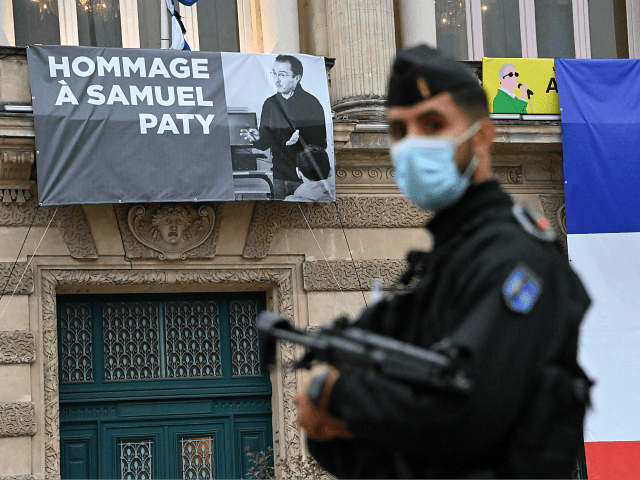Despite the lockdowns in many countries due to the Wuhan virus pandemic, Europe saw at least seven terrorist attacks in 2020, with radical Islamic terror seeing a particular resurgence in France.
The first Islamist terror attack took place prior to the coronavirus pandemic in January, when a Salafist named Nathan C. stabbed three people in the French commune of Vileljuif, killing one and injuring the two others.
In February, a man was shot dead by police in Streatham, England, after he had stabbed multiple people. The attacker was later identified as Sudesh Amman, who had been released from prison just days prior, having been convicted of terrorism offences in 2018 for disseminating terrorist material.
Following the outbreak of the coronavirus, Europe initially saw fewer radical Islamic terror attacks, although there was a mass stabbing by a Sudanese migrant yelling “Allahu Akbar” in the French commune of Romans-sur-Isère in April that left two dead and at least seven more wounded.
Several other migrants were later also arrested in connection to the attack, and investigators later revealed that the migrant had been angry “that he lives in a country of non-believers.”
England also suffered another terror attack in June, when 25-year-old Libyan refugee Khairi Saadallah took a knife to six people at a park in Reading, killing three of them, including an American citizen, after being released early from prison.
But a new wave of attacks was sparked by the September republishing of Mohammed cartoons by the satirical magazine Charlie Hebdo at the start of a trial for accomplices of the terrorists who attacked the offices of the magazine in 2015, killing a dozen people.
The first attack that was said to have been motivated by the republishing of the Mohammed cartoons came in late September, when a Pakistani migrant attacked two people with a meat cleaver outside the former offices of the magazine. The 18-year-old later admitted to police he wanted to attack Charlie Hebdo employees, although they had long left the premises.
Just weeks later on October 16th, French teacher Samuel Paty was beheaded in the street by a Chechen refugee in the department of Yvelines. The terrorist was said to have been motivated by the fact Paty had shown his class the Mohammed cartoons published by Charlie Hebdo during a class on freedom of expression.
The killing of Paty shocked France and led to Presiden Emmanuel Macron promising to crack down on Islamist groups and political Islam across the country.
Another terror attack struck the French city of Nice on October 29th, when a Tunisian illegal immigrant murdered three churchgoers in the Notre-Dame Basilica, nearly beheading one of the three victims before being subdued by French police and arrested.
21-year-old Brahim Aouissaoui was later charged by French authorities for the murders, with investigators finding a picture of the Chechen refugee who murdered Samuel Paty on his mobile phone.
October also saw a terror attack take place in the German city of Dresden when a Syrian migrant attacked two tourists, killing one and injuring another with a knife. (The incident was classified as radical Islamic terrorism only weeks after the attack.)
The suspect in the case, 20-year-old Abdullah A H H, had come to Germany during the height of the migrant crisis and been released from juvenile detention just days prior to the attack.
The Austrian capital of Vienna was the next target of radical Islamic terror when 20-year-old Kujtim Fejzulai shot and killed four people in the centre of the city in a district known for its bars and nightlife and injured 22 others.
Fejzulai, a dual national with citizenship in Austria and North Macedonia, had previously attempted to join the Islamic State terrorist group, being convicted for this in April of 2019 and sentenced to 22 months in prison — but, like several other jihadists, he was given an early release.
Following the attack, Austrian Chancellor Sebastian Kurz vowed to ban political Islam entirely, saying: “In the fight against political Islam, we will create a criminal offence called ‘political Islam’ in order to be able to take action against those who are not terrorists themselves, but who create the breeding ground for it.”
While radical Islamic terrorism saw the most fatalities and the most attacks in 2020, an attempted Brexit-related terror attack took place on January 31st when radical Irish republican terrorists planted a bomb on a truck in the British province of Northern Ireland that was set to explode as the United Kingdom left the European Union.
Police said the group, known as the Continuity IRA (Irish Republican Army), planted the bomb aboard the wrong truck and that it never left the company yard. The terror group had intended to explode the bomb at a dock in Scotland.
2020 saw few far-right terrorist attacks in Europe. A mass shooting in the German city of Hanau that left eleven dead was initially thought to have been motivated by far-right ideology, but German police later stated that the suspect, Tobias Rathjen, was not linked to any known terrorist groups and was not motivated by far-right ideas.
Instead, investigators said Rathjen was motivated by a conspiracy theory in which he believed he was being monitored by a secret German spy agency.

COMMENTS
Please let us know if you're having issues with commenting.